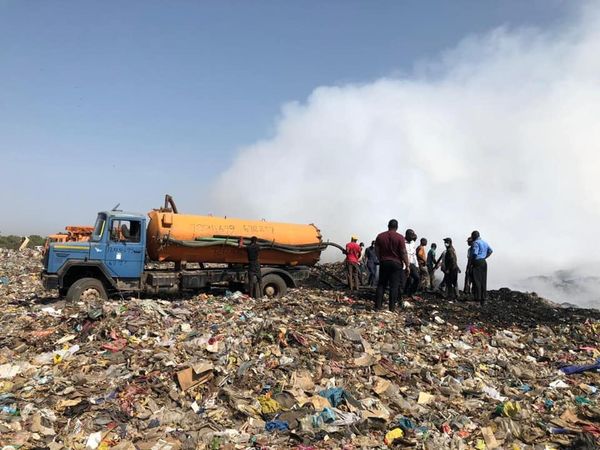Gambiaj.com – (BANJUL, Gambia) – Kemo Fatty, a former Project Manager with the Kanifing Municipal Council (KMC) and an environmental advocate from Bakoteh, appeared before The Gambia’s Local Government Commission of Inquiry on October 15, 2024, to testify about his tenure with the council’s “Mbalit” project.
In a detailed account, Fatty described his work to mitigate pollution at the Bakoteh dumpsite and claimed to have faced systematic corruption and resistance from KMC’s senior management.
Fatty, known for his commitment to environmental issues, recounted his years of voluntary service at the dumpsite, protecting communities like Bakoteh, Manjai, and the SOS School from pollution. Appointed as Project Manager 2 for the Mbalit Project in March 2020, Fatty worked primarily on waste management and pollution control at the dumpsite, an issue he said had drawn considerable pressure from nearby communities. He continued his service on the KMC’s environment and sanitation committee, even after his official employment.
Throughout his 100 days in the project role, Fatty said he became disillusioned with KMC’s handling of funds, claiming he encountered a troubling lack of financial accountability. He cited incidents where KMC officials allegedly bypassed established procedures by directly taking daily collections from the dumpsite without oversight or documentation. According to Fatty, these irregularities led to a significant financial discrepancy, with over D270,000 unaccounted for.
Fatty testified that he reported the inconsistencies to the internal audit department but was told that “nothing would come out of it.” Despite promises of an investigation, Fatty claimed that his concerns were ultimately ignored. He detailed how officials, including Lamin Sanyang (Director of Services), Bakary Singhateh (Project Manager 1), and Lamin F. Badjie (Deputy Director of Services), were reportedly involved in the direct collection of revenue, bypassing the standard procedure that required funds to be submitted to a designated cashier.
Amidst his attempts to tighten revenue collection protocols, Fatty described facing increasing resistance. At one point, he halted the use of electronic payment machines temporarily, aiming to address suspected misuse. However, his actions were met with disciplinary threats, leading to his suspension without pay and subsequent resignation.
Fatty said his efforts to maintain transparency drew criticism from KMC’s leadership, who he believes sought to marginalize him from further involvement in environmental matters. He alleged that his exclusion from KMC’s sanitation committee meetings was deliberate, as it prevented him from holding officials accountable for the alleged mismanagement of funds.
Fatty’s testimony included a collection of evidence, including employment records, letters of suspension, and correspondence detailing his attempts to address the reported financial discrepancies. The Commission Chair, Jainaba Bah, ordered KMC’s IT department to grant Fatty access to his KMC email account to retrieve additional evidence for his claims.
Fatty’s testimony adds to growing scrutiny over KMC’s financial oversight, with public calls for improved accountability in managing municipal resources.










